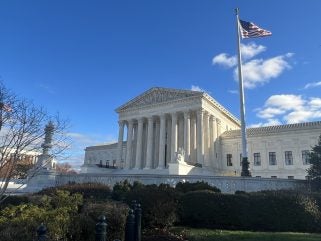
The US Supreme Court on 16 October allowed a Biden administration regulation aimed at limiting pollution from coal-fired power plants to remain in place while existing legal challenges play out.
The justices rejected a challenge from Republican-led states and industry groups to block the Enviromental Protection Agency rule – the third time during recent challenges that the conservative majority on the Supreme Court bench has left an environmental regulation in place, including Rules governing pollution for mercury and methane. One justice, Clarence Thomas, dissented.
Justices Brett Kavanaugh and Neil Gorsuch said they thought the challengers would likely win on at least some of their claims eventually. Justice Kavanaugh wrote that the rule does not need to be blocked yet because compliance work would not have to begin before June 2025 and the case could end up back before the high court well before then.
The rule requires many coal-fired power plants to capture 90% of their carbon emissions or shut down within eight years, though deadlines do not take effect for several years. The challengers argued that the EPA overstepped its authority and imposed unattainable standards.
Rich Nolan, president and CEO of the National Mining Association, said his group would continue to fight the rule. He said it would require power plants to use unaffordable technology or shut down at a time when the nation’s electricity demand is forecast to double. “If this rule is allowed to stand the results for the American people and economy will be catastrophic,” he said.
The power industry is the nation’s second-largest contributor to climate change, and the rule is a key part of president Joe Biden’s promise to eliminate carbon pollution from the electricity sector by 2035 and economy-wide by 2050.
The Natural Resources Defense Council said the new standards are modest but vital, and the court’s decision to leave them in place is a win for common sense. “This warrants a sigh of relief from the millions of Americans experiencing the impact of the climate crisis,” said attorney Meredith Hankins.
Other environmental regulations from the EPA have suffered from the court in recent years. In 2022, the justices limited the EPA’s authority to regulate carbon dioxide emissions from power plants with a landmark decision. In June, the court halted the agency’s air-pollution-fighting ‘good neighbour’ rule.






